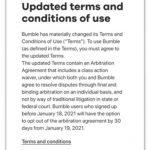
Texas A&M (TAMU) does medical experiments on dogs. PETA objects to these experiments and commented on TAMU’s social media pages. TAMU blocked PETA, which led to a prior lawsuit that settled. The settlement terms included: “TAMU would not exercise viewpoint…

Alkutkar used the dating app Bumble. He paid money to get extra visibility for his dating profile and claims he got poor results, so he sued Bumble for false advertising. Bumble successfully redirects the case to arbitration based on its…

Troia was a LoanStreet employee. He was allegedly fired for cause. Troia posted disparaging comments about LoanStreet at Glassdoor.com, Reddit.com, and Teamblind.com. He then worked to boost the posts’ visibility, including: the posts asked users to “follow [his] link and…

This lawsuit relates to the “Toast Plus” app that was available in Apple’s app store. The plaintiffs claim it was a spoof app designed to steal cryptocurrency worth $5k in Diep’s case and $500k in Nagao’s case (ouch). The plaintiffs’…

I did a media interview regarding AB 2273 that I thought was worth sharing here. For more on the bill, see my prior coverage: Op-ed Explainer Deep dive Can the existing UK Age-Appropriate Design Code tell us anything about what…

Section 230 Doesn’t Protect App Stores That Sell Virtual Chips for Casino Apps–In re Apple App Store
Introduction This case relates to “social casino apps” that simulate casino games like slot machines. Players pay real cash to buy virtual chips, which they can only use in the app, i.e., the player can never cash out their virtual…

Kyle Hanagami is a choreographer. He made a video called “How Long” featuring his choreography. It now has 36M+ views. Fortnite offered an emote called “It’s Complicated.” “Ten of the poses in the video and the emote are the same.”…

The plaintiff runs R18, a Japanese-focused adult site. It has US copyright registrations for 50k+ videos. The defendant runs ThisAV, which the court describes as a Japanese-language video-hosting service. When I visited ThisAV (NSFW) this morning, it self-described (via Google…

I’ve regularly done a roundup post of my summer accomplishments when school starts. This year is a little different. I completed my last Internet Law class before Thanksgiving 2021 and had Spring semester off. Then, due to some personal circumstances…
